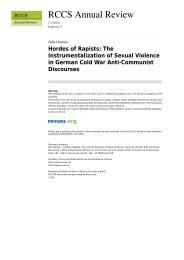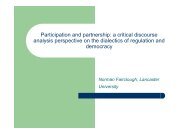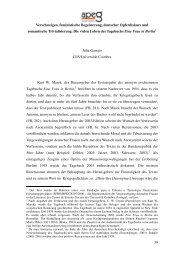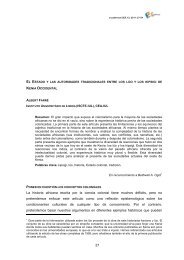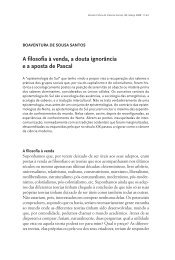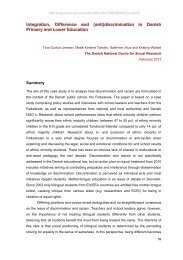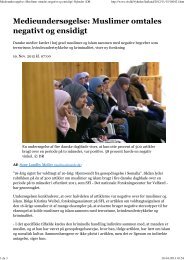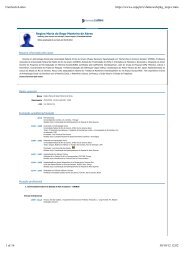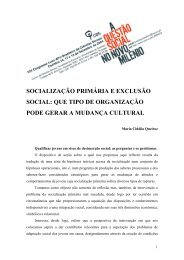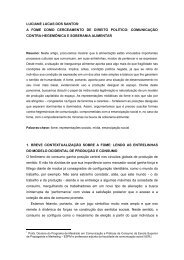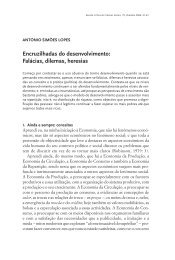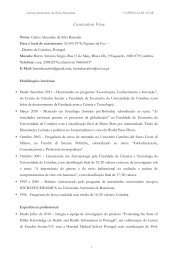Analysis of Integration Policies and Public State-Endorsed ...
Analysis of Integration Policies and Public State-Endorsed ...
Analysis of Integration Policies and Public State-Endorsed ...
You also want an ePaper? Increase the reach of your titles
YUMPU automatically turns print PDFs into web optimized ePapers that Google loves.
Working paper produced within the TOLERACE project<br />
regarding publicly available social security, including social <strong>and</strong> health services,<br />
social goods, education <strong>and</strong> access to <strong>and</strong> delivery <strong>of</strong> goods <strong>and</strong> services,<br />
including accommodation. The prohibition <strong>of</strong> discrimination also concerns<br />
membership <strong>of</strong> <strong>and</strong> participation in organizations in various occupations <strong>and</strong> the<br />
benefits such organizations give their members.<br />
5. According to The Act about probation <strong>of</strong> discrimination on account <strong>of</strong> race etc. a<br />
person within business or non-pr<strong>of</strong>it activities who denies to serve a person at<br />
the same level as others – or give him or her the same access to a public place,<br />
performance, exhibition, gathering or the like – due to his or her race, skin<br />
colour, national or ethnic origin, belief or sexual orientation, is penalised or<br />
imprisoned until 6 months.<br />
After the Cartoon affair in Denmark (in 2005 <strong>and</strong> 2008) another law (introduced into law<br />
in 1866, then § 156) has become relevant in discussions <strong>of</strong> discrimination on religious<br />
grounds:<br />
6. The so-called Blasphemy Act (§140 <strong>of</strong> the criminal code), stating that anyone<br />
who publicly mocks the belief or worship <strong>of</strong> God <strong>of</strong> any a legally established<br />
religion or religious community, is penalised or imprisoned until 4 months.<br />
3.2. Involved parties <strong>and</strong> institutions<br />
Both Act against Racism (no 1) <strong>and</strong> The law against hate crimes (no 2) are acts within<br />
the criminal code, <strong>and</strong> therefore involve filing compliant to the police, which then decide<br />
whether the state prosecutor will complete proceedings. Despite the Blasphemy act (no<br />
6) is in the criminal code, neither local police nor regional state prosecutors may<br />
complete proceedings. Only the central state prosecutor may complete proceedings<br />
that concern the Blasphemy act. The Act on Prohibition <strong>of</strong> Discrimination on the Labour<br />
Market (no 3), the Act on Ethnic Equal Treatment (no 4) <strong>and</strong> the Act about probation <strong>of</strong><br />
discrimination on account <strong>of</strong> race etc. (no 5) are civil laws, <strong>and</strong> involve filing complaints<br />
to the Board for Equal Treatment. In Denmark the main governmental institutions<br />
involved in securing <strong>and</strong> trying the national laws are the Board for Equal Treatment <strong>and</strong><br />
the Institute for Human Rights.<br />
The Board for Equal Treatment is situated under the National Social Appeals<br />
Board, which serves as secretariat <strong>of</strong> the Board <strong>of</strong> Equal Treatment. The Board deals<br />
with complaints related to discrimination based on gender, race, colour, religion or<br />
belief, political views, sexual orientation, age, disability or national, social or ethnic<br />
66



